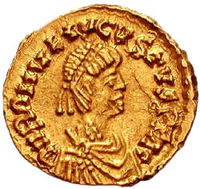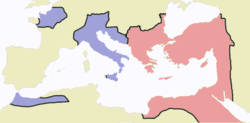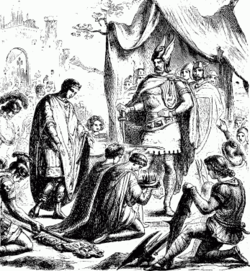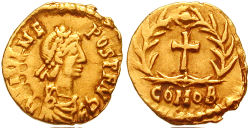Romulus Augustulus
2008/9 Schools Wikipedia Selection. Related subjects: Ancient History, Classical History and Mythology; Historical figures
| Romulus Augustus 'Augustulus' | |
| Emperor of the Western Roman Empire |
|
 Tremissis of Romulus Augustus 'Augustulus'. |
|
| Reign | 31 October 475 - 4 September 476 |
|---|---|
| Full name | Romulus Augustus |
| Died | After 476 {After 507{?} |
| Place of death | Castellum Lucullanum |
| Predecessor | Julius Nepos |
| Successor | Odoacer |
| Father | Orestes |
Romulus Augustus (c. 461/463 – after 476), also called Romulus Augustulus ("Little Augustus"), was a Western Roman Emperor who reigned from 31 October 475 to 4 September 476. Historically, his reign has been used to mark the fall of Rome and the onset of the Dark Ages.
The historical record contains few details of Romulus' life. He was installed as emperor by his father Orestes, the commanding general of the Roman army, after Orestes had deposed the previous emperor Julius Nepos. Romulus, little more than a child, acted as a figurehead for his father's rule. Reigning only ten months, Romulus was deposed by the Germanic chieftain Odoacer and sent to live in the Castellum Lucullanum in Campania; he disappears from the historical record afterward.
Romulus' deposition is traditionally cited as the end of the Western Roman Empire and the beginning of the Middle Ages. Although the Eastern Roman Empire survived until 1453, Roman authority in Italy and Gaul had all but collapsed by the time of Romulus' reign.
Life
Romulus' father Orestes was a Roman citizen, originally from Pannonia, who had served as a secretary and diplomat for Attila the Hun and later rose through the ranks of the Roman Army. The future emperor was named Romulus after his maternal grandfather, a nobleman from Poetovio in Noricum. Many historians have noted the irony that the last western emperor bore the names of the legendary founder of Rome and its first emperor, but this is a coincidence.

He is widely known by the disparaging nickname "Romulus Augustulus", though he ruled officially as Romulus Augustus. The Latin suffix -ulus is a diminutive; hence, Augustulus effectively means "Little Augustus". Some Greek writers even went so far as to corrupt his name sarcastically into "Momylos", or "little disgrace".
Orestes was appointed Magister militum (master of soldiers) by Julius Nepos in 475. Shortly after his appointment, Orestes launched a rebellion and captured Ravenna, the capital of the Western Roman Empire since 402, on August 28, 475. Nepos fled to Dalmatia, where his uncle had ruled a semi-autonomous state in the 460s. Orestes, "from some secret motive," refused to become emperor, and installed his son on the throne on October 31, 475.
The empire they ruled had shrunk significantly over the previous 80 years. Imperial authority had retreated to the Italian borders and parts of southern Gaul, and the Eastern Empire treated its western counterpart as a client state. The Eastern Emperor Leo, who died in 474, had appointed the western emperors Anthemius and Julius Nepos, and Constantinople never recognized the new government. Neither Zeno nor Basiliscus, the two generals fighting for the Eastern throne at the time of Romulus' accession, accepted him as ruler.
As a proxy for his father, Romulus made no decisions and left no monuments, though coins bearing his name were minted in Rome, Milan, Ravenna, and Gaul. Several months after Orestes took power, a coalition of Heruli, Scirian and Turcilingi mercenaries demanded that he give them a third of the land in Italy. When Orestes refused, the tribes revolted under the leadership of the Scirian chieftain Odoacer. Orestes was captured near Piacenza on August 28, 476 and swiftly executed.
Odoacer advanced to Ravenna, capturing the city and the youthful Emperor. Romulus was compelled to abdicate the throne on September 4, 476. This act is considered the end of the Western Roman Empire, although Romulus' deposition did not cause any significant disruption at the time. Rome had already lost its hegemony over the provinces, Germans dominated the "Roman" armies and Germanic generals like Odoacer had long been the real powers behind the throne. Italy would suffer far greater devastation in the next century when Emperor Justinian I re-conquered it.
After Romulus' abdication, the Roman Senate, on behalf of Odoacer, sent representatives to the Eastern Roman Emperor Zeno. Zeno was asked by the senate to formally reunite the two halves of the Empire: "the west...no longer required an emperor of its own: one monarch sufficed for the world". He was also asked to make Odoacer a Patrician, and administrator of Italy in Zeno's name. Zeno pointed out that Senate should rightfully have first requested that Julius Nepos take the throne once more; but he nonetheless agreed to their requests. Odoacer then ruled Italy in Zeno's name.
After the abdication
Romulus' ultimate fate is unknown. The Anonymus Valesianus wrote that Odoacer, "taking pity on his youth", spared Romulus' life and granted him an annual pension of 6,000 solidi (roughly a senator's income) before sending him to live with relatives in Campania. Jordanes and Count Marcellinus, however, say Odoacer exiled Romulus to Campania, and do not mention any reward from the German king.
The sources do agree that Romulus took up residence in the Lucullan Villa, an ancient castle originally built by the Scipio family in Campania. From here, contemporary histories fall silent. In the History of the Decline and Fall of the Roman Empire, Edward Gibbon notes that the disciples of Saint Severinus of Noricum were invited by a "Neapolitan lady" to bring his body to the villa in 488, "in the place of Augustulus, who was probably no more." The villa was converted into a monastery before 500 to hold the saint's remains.
Cassiodorus, then a secretary to Theodoric the Great, wrote a letter to a "Romulus" in 507 confirming a pension. Thomas Hodgkin, a translator of Cassiodorus' works, wrote in 1886 that it was "surely possible" that the Romulus in the letter was the same person as the last western emperor. The letter would match the description of Odoacer's coup in the Anonymus Valesianus, and Romulus could have been alive in the early sixth century. But Cassiodorus does not supply any details about his correspondent or the size and nature of his pension, and Jordanes, whose history of the period abridges an earlier work by Cassiodorus, makes no mention of a pension. The connection between the last western emperor and the "Romulus" in this letter is, at best, uncertain.
Dispute over the last emperor
Because Romulus was a usurper, Julius Nepos was claimed to legally hold the title of emperor when Odoacer took power. Some have argued that Nepos, who ruled in Dalmatia until his murder in 480, should be recognized as the last Western Roman Emperor. But few of Nepos' contemporaries were willing to support his cause after he fled Italy. Following Odoacer's coup, the Roman Senate sent a letter to Zeno, saying that "the majesty of a sole monarch is sufficient to pervade and protect, at the same time, both the East and the West." While Zeno told the Senate that Nepos was their lawful sovereign, he did not press the point, and accepted the imperial insignia brought to him by the senate.

